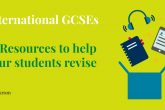
With exam season around the corner it’s time to get your students thinking seriously about revision. Here are our top tips to help improve recall, manage time and energy levels and much more.
International GCSEs and GCSEs are looming and your students are feeling the pressure. What seemed like a million years away in years 8 and 9 is now right on the doorstep. No matter what your students think of each individual subject, they’re bound to be a little apprehensive when they realise just how many subjects they have to prepare for.
Equipping them with personalised revision strategies will help them prepare mentally, take on the challenge and ace their exams. In this guide we look at three key areas you can walk through with your students.
1. Improving recall
Students often fall into the trap of being good at recognising information, yet being bad at actually retrieving it when it counts.
Those post-it notes on the kitchen cupboards with famous battle dates might well become very familiar, but they probably won’t help much on exam day. It’s therefore essential that students use some tried-and-tested ways of memorising and recalling information.
Double-note taking
Students take notes all the time – but what do they actually do with them later? Rather than putting them away to gather dust on the shelf, get your students into the habit of revisiting their notes and writing them up into a meaningful reflection of what they learned.
Organising the information under headings will help them solidify their understanding, highlight areas whether they are less clear on the topic, and help with recall later. If they want to take an extra step, they can write questions of themselves to spark further research.
Flashcards
Flashcards can be a very helpful way to test recall information under pressure. By pairing up with others, students can effectively test each other on how easily they can remember what they need. They can contain quick-fire questions, images (e.g. geographical features), equations, periodic table elements – the list is endless. Students simply need to define what they are being tested on and how. If they do badly in the activity, they know they need to study more.
Mnemonics
Mnemonics help students remember complex information by encoding in an easy-to-remember phrase or acronym.
Most of us are not great at recalling more than about seven items at once. By using mnemonics, we can squeeze a lot of meaningful information into a small space – they are effectively the ZIP files of memorisation.
Students can invent their own or use common mnenonics to help them. Richard Of York Gave Battle In Vain is a famous way to remember the colour spectrum (Red, Orange, Yellow, Green, Blue, Indigo, Violet), for example.
Visualisation and Association
Another ancient technique – visualisation – is very popular among people who compete in memory competitions like the World Memory Championships.
It works and it works simply: you carve out a familiar space in your mind’s eye and populate it with easily recognisable items (in technical terms, these are called loci). To each loci, you attach something you want to attach what you need to remember. The theory goes that these objects are much easier to remember than distinct facts or pieces of information, so when you return to them during an exam, they help you recall the information and facts you need.
State-dependent memory and mindfulness
Psychological studies have shown that the way we feel when we learn something will be the state in which we best recall the information later.
If your students practice mindfulness techniques before settling down to a revision session, they can observe how they are feeling and engage in positive self-talk. This will elevate their moods and receptiveness during the revision session. While they are likely to be nervous before an exam, if they return to practising the same mindfulness techniques, they can boost their mood and ability to retrieve the information they’ve been studying.
Read more about types of forgetting on Simple Psychology.
2. Managing time and energy levels
As teachers well know, students’ energy levels and attention spans fluctuate (a lot) during the day. Students, however, might not be so aware of their own energy cycles. Tell students to pay close attention to how they feel during the day and when they are most receptive to studying. They should use the times when they have the most mental energy to study the subjects they find the most challenging (hint: it’s probably not right after lunch). Also, tell students that well-rested brains are far more efficient and sleep is important – so no more midnight study sessions!
Time management
Although students might be tempted to plan out marathon revisions sessions, you should advise them to break them down into manageable chunks. The Pomodoro Technique, which was developed by Francesco Cirillo in the 1980s (and named after Italian tomato-shaped kitchen timers), breaks work down into 25-minute segments and rewards hard work with short breaks.
An ideal revision plan would follow a pattern like this:
- History revision: 25 minutes
- Five minute break
- History revision: 25 minutes
- Five minute break
- History revision: 25 minutes
- Twenty minute break
After a long break, it’s often a good idea for students to switch subjects entirely – from a humanity to science or maths, for example, as variety is key to staying interested and engaged.
Scheduling
Cramming is not an effective way to revise – it overloads students and stresses them out. It’s far more effective to space revision time out over weeks, rather than single day sessions or pulling all-nighters.
Quick tip: have students plan out a study schedule with you in class – and follow up with them regularly to make sure they are sticking to it.
3. Accountability and working together
For students (and adults) it’s all too easy to waste time on social media or playing video games during “revision” time. Frankly, it’s just more fun. Many students will recognise that they give in to these temptations too easily – and a way around this is to introduce the idea of peer accountability.
Encourage your students to form revision groups. Having the responsibility to be at the library or park together at a certain time means teenagers will actually get up and get to work. It’s no fun disappointing people.
It’s important that students do this with their friends, but they should also be aware that although it can be fun, they should stay on task. It’s too important for their futures not to.
Stay tuned for our next post where we’ll be sharing some of our favourite tools and apps to help students get ready for their GCSEs.

